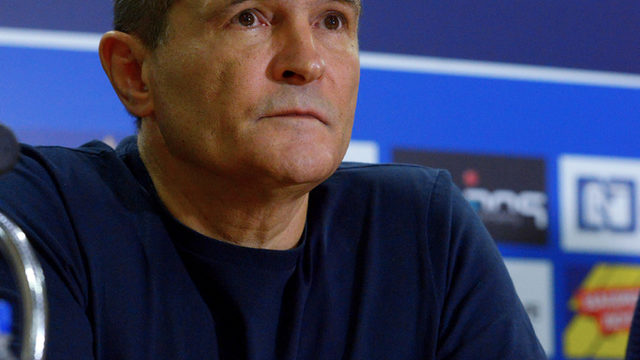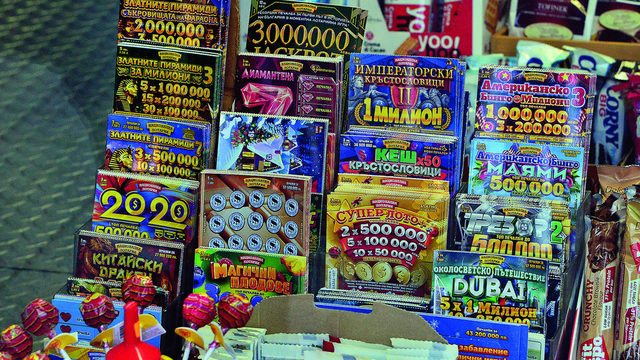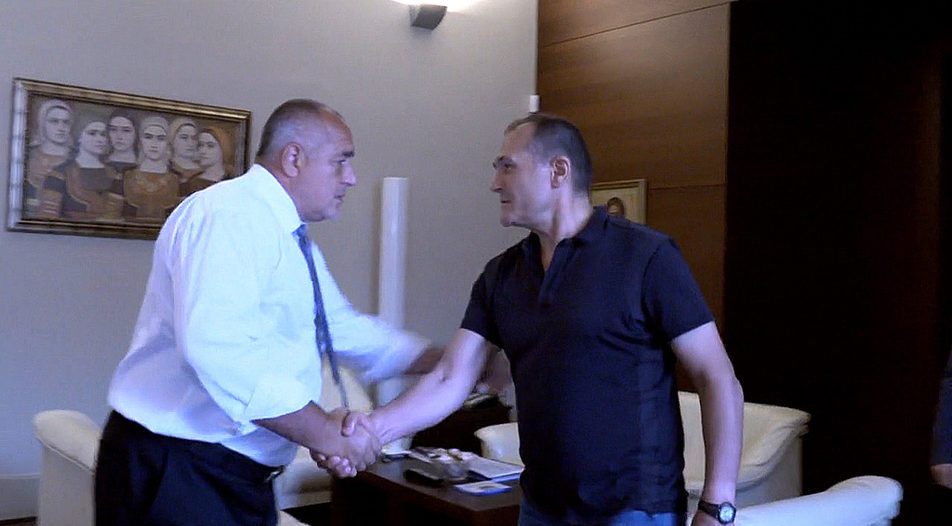| - There have always been suspicions that gambling in Bulgaria is a monopoly - The struggle for control of NovaTV likely explains the charges against Mr Bozhkov |
A runaway gambling tycoon This line could open your average mafia thriller but the story of Vasil Bozhkov, now held in police custody in the United Arab Emirates according to the Bulgarian Prosecutor's Office, could give scriptwriters ideas for much more sinister plots.
Mr. Bozhkov is not the first oligarch among wealthy Bulgarian businessmen who made their money in the murky 1990s to have aroused the wrath of Bulgarian authorities recently. But surely he is the biggest and one of the savviest.
Charged in absentia with tax evasion, extortion, influence peddling, illegal possession of cultural artefacts (11 counts in total), Mr Bozhkov looks like a supervillain. But there is a bigger story. His case cuts deep into Bulgaria's culture of mixing politics with business, sometimes making it impossible to distinguish where private interests overwhelm public ones. The blitzkrieg started by the Bulgarian authorities against Mr Bozhkov is as much about crime and corruption, as it is about media freedom, shadowy control of government bodies and how big business operates in Bulgaria.
Why is the gambling drama playing out now?
The Prosecutor's Office charged Mr Bozhkov in January 2020 with tax evasion and leading an organized criminal group. Later, when it was apparent that Mr Bozhkov had left Bulgaria and would not be coming back, the prosecutors launched an investigation of his suspected involvement in murders, rapes and racketeering. Three of his business associates were also arrested, as well as a former chairman of the State Commission on Gambling (SCG). According to the prosecution, Mr Bozhkov and his companies had allegedly evaded paying half a billion of levs in taxes and fees.
The public side of the attack emerged after Mr Bozhkov's former partners in the gambling business - the Naydenov brothers Boyan and Tsvetomir accused him of tax fraud and extortion in the media. Together with their father Stefan they own Efbet, a chain of casinos and bookmakers. They are partners with Mr Bozhkov in ten of their nearly 100 gambling joints. They own a stake in sports betting operator Eurofootball, in which Boyan Naydenov held a senior position for years.
In interviews for local media, the brothers allege that Mr Bozhkov exercised behind-the-scenes control of SCG, the industry regulator, allowing the two games of chance owned by him - Lottery Bulgaria and National Lottery, to evade taxes by taking advantage of a legal loophole. They accused him of death threats against them and filed several complaints to the Prosecutor's Office, the Commission for Protection of Competition and the Ministry of Finance concerning the tax evasion.
Mr Bozhkov has denied wrongdoing, pointing out that the gambling regulator and the National Revenue Agency (NRA) had exercised strict control of his business. According to his business partners, Lottery Bulgaria and National Lottery both took advantage of a legal option to use a taxation regime more favourable than the one used by the state-owned sports betting organization Bulgarian Sports Totalizator (BST). Strangely, NRA and the Ministry of Finance have not questioned this practice for more than five years, although it saved the two companies between 200 and 500 million levs in taxes, depending on different estimates (see sidebars).
The Naydenovs claim that their interviews are a type of life insurance, yet there is a suspicion that they haven't come public without a prior assurance that the authorities will take their side in their business dispute with Mr Bozhkov.
Why did the government take sides and strike Bozhkov?
Vasil Bozhkov's domination of the gambling industry - a heavily regulated business - has not changed in the last ten years, for at least eight of which GERB has been in power. Mr Bozhkov's tax evasion techniques were also well known to the Bulgarian tax administration which has closed its eyes for years. The question is what caused the ruling party's sudden change of heart.
The easiest answer is the appointment of the new Prosecutor General, Ivan Geshev. He took office in November 2019 and rushed to prove himself with a string of investigations and charges against notorious businessmen. But Mr Geshev had been a prosecutor for more than fifteen years before and he has never been known to take on the power of the day, unless such a move serves some other goal, and not necessarily a judicial one. In addition, opposition politicians have been pointing to the tax avoidance scheme for more than two years but the prosecution has failed to take notice until now.
Apart from the potential political motives - Mr Bozhkov probably sponsored Maya Manolova, the main contender to unseat the ruling GERB party in Sofia in 2019 mayoral election, and now the attack is payback, or pressure from foreign governments complaining that their companies were barred from Bulgaria's gambling market - the most plausible reason is the fight for control of NovaTV - the biggest private television channel in Bulgaria.
Who controls TV, controls the political power
NovaTV's owner - Sweden's Modern Times Group (MTG), offered its Bulgarian holdings for sale in 2018 as part of an overall transformation of its business. MTG initially selected Czech billionaire Petr Kellner to acquire NovaTV, but Bulgaria's competition authority blocked the deal with poorly concealed political motives. Mr Kellner is not a known quantity in Bulgaria - a threat that the government could not ignore. Controlling or having a serious say in the TV channels' news coverage is a key political strategy in Bulgaria, because the three biggest networks - NovaTV, bTV and public television BNT, have an outsized influence following the demise of the print media in the country.
With the withdrawal of foreign investors in the TV networks - MTG and Central European Media Enterprises which still owns bTV, the door was wide open for Bulgarian investors to enter. This already happened with the newspapers in 2010-2012, when Germany's WAZ group sold the two biggest dailies in Bulgaria to local investors and both newspapers immediately began toeing the government's line. A similar process unfolded all over Eastern Europe, solidifying the role of strongmen like Viktor Orban in Hungary or Andrej Babis in the Czech Republic.
After a year of manoeuvring, MTG sold NovaTV to Domuschiev brothers Kiril and Georgi. The brothers have diversified business interests and had owned indirectly one of Bulgaria's daily newspapers (now defunct), but what is more important, they are well-known GERB loyalists and are not embarrassed to cut deals with unsavoury businessmen. Almost immediately after the acquisition, NovaTV was taken over by lieutenants of Delyan Peevski - Bulgaria's eminence grise, who has developed a lucrative practice of lending the support of his media empire comprising the most popular yellow newspapers to whatever government is in power in exchange for business favours.
Bozhkov's failed scheme
Now enter Vasil Bozhkov. Around the start of NovaTV's sale, the advertising of National Lottery at NovaTV dried up. According to sources of Bulgaria's Capital newspaper, before the ads were discontinued they amounted to over 30 million levs annually, or a little less than a quarter of the TV channel's overall revenue. The formal reason was NovaTV's reluctance to support Mr Bozhkov's gambling business during the attack mounted in 2018 by GERB's coalition partner Valery Simeonov who had introduced amendments to the gambling law explicitly banning any advertising of lotteries.
But the more likely reason for Mr Bozhkov's decision to stop its advertising campaign has to do with the sale of NovaTV. With the revenue from the lottery ads gone, the price of the TV channel would have been seriously depressed. Taking control of the biggest TV network in Bulgaria, or at least controlling a sizable share in it would have strengthened Mr Bozhkov's grip of the gambling market in Bulgaria. But it didn't happen. Kiril and Georgi Domuschiev paid the full price MTG asked, despite the deterioration of NovaTV's cash flow.
Instead, when NovaTV finally changed hands in 2019, National Lottery restored part of its advertisements, but they were far from their previous magnitude. There is no explanation for this move - it might have been a strictly business decision to optimize costs, or an attempt by Mr Bozhkov to remind the new owners of the TV network how much they depend on his goodwill and deep pockets. Whatever the reason, the dwindling revenue from lottery advertisements might have given Kiril and Georgi Domuschiev a reason solid enough to decide to start their own lottery without depending on the whims of a third party. Mr Bozhkov's previous partners, the Naydenov family who were trying the break the connection with him, were readily available to provide the experience and know-how.
The massive presence of Mr Peevski in the deal for NovaTV is another reason to believe that such a scheme was put in motion. His star rose in 2002 when he entered politics, riding on the back of his mother who was appointed CEO of Bulgarian Sports Totalizator. The state-owned organization was a monopoly with a huge budget which was one of the main spoils of any political party in power. There is no doubt that Mr Peevski has been eyeing the lottery market for a long time, trying several years ago to monopolize the distribution of lottery tickets.
Mr Bozhkov commented in an interview for Radio Free Europe that the attack probably aims to take a profitable business away from him and hand it over to someone else. "There is certainly someone else. I don't know who he is; we are thinking, analyzing, investigating," he stated.
Kiril Domuschiev, the owner of the football club Ludogorets whose primary sponsor is Efbet, announced in February he knows Mr Bozhkov well and he has "never been threatened" by the gambling tycoon. Domuschiev added that two years ago (before he purchased NovaTV) he opposed proposed restrictions to gambling advertisement. Back then, the Confederation of Employers and Industrialists in Bulgaria chaired by Domuschiev published an official statement. The Naydenov brothers also denied having any plans to start a lottery business, either alone or in partnership with the Domuschiev brothers.
It's possible that the war over the gambling business began because of Mr Bozhkov's paranoia. Fearing that his former business partners will launch an alternative lottery, he might have decided to pressure them which forced Naydenov brothers to go public about the conflict. But the actions of Bulgarian authorities show that Mr Bozhkov probably had some grounds to be paranoid.
The state will seize control of fresh resources to prop up friendly media
Almost immediately after the Prosecutor's Office filed charges against Mr Bozhkov, the Bulgarian parliament considered two changes to gambling legislation. The first envisages that instant lotteries could be run only by the state operator, and scratchcards only sold at licensed outlets located at least 300 meters from the nearest school. The changes are now in force, meaning that Bozhkov's largest gambling businesses will be forcibly closed.
Mr Bozhkov has said that the changes will allow the state "to take away a functioning business forcibly and anti-constitutionally."
Games of chance have exploded in Bulgaria since 2014 and, according to some estimates, 60% of Bulgarians are avid players. The turnover in this gambling segment is estimated at around 2% of GDP. Gamblers usually come from the most vulnerable social strata - pensioners, unemployed, minorities and people with little education who impoverish themselves on the back of their dream of becoming lotto-millionaires.
Whether the ban on the private lotteries is justified is an important question but something that the authorities haven't done is more revealing about the new gambling regulation.
At the moment, no one is talking about the lottery ads that have inundated the TV channels and which are in a legal grey zone. It is precisely due to these ads showing happy winners that the tickets are enormously popular and many people scratch cards in the hope of becoming the next millionaire. Two years ago, it was again Valery Simeonov who proposed legislative changes to curb this type of advertising but they never made it to the assembly's floor. This issue is no longer raised.
It is still unclear whether the state-owned BST will pick the tab left from the private lotteries. Its management has said it has no such ambition, although it spells increased revenues. At the same time, the Lafka kiosk chain - one of the biggest vendors of lottery tickets, was closed down almost immediately after the parliament voted to ban the privately run games of chance. But there are already rumours that BST will buy Lafka owned by Mr Peevski, in order to expand its operations.
The parliament's omission to shut down advertisements of lotteries leaves the impression that the government simply aims to take hold of this revenue stream and direct it to friendly media. Just like NovaTV which lost significant revenue in the last two years and is now owned by businessmen friendly to the government who had overpaid to have it.

| Who is Vasil Bozhkov? Mr Bozhkov is an emblematic figure from the transition years after the fall of the Communist regime and one of the few who has not moved abroad or to the netherworld. That he controls gambling in Bulgaria and no one could enter the business without his say-so has been an open secret for many years. |

| How much is the lottery business worth? At least an estimated 2 billion levs per year in the last five years. There is no exact figure due to the murky financial reports of New Games (the main company behind National Lottery) and National Lottery (which organizes sports and casino bets) uploaded to the Commercial Register and the unclear modus operandi of the companies. After the scandal broke out, the two companies published data, according to which their revenue in 2018 slightly topped 1.5 billion levs, way above expectations. |
| - There have always been suspicions that gambling in Bulgaria is a monopoly - The struggle for control of NovaTV likely explains the charges against Mr Bozhkov |
A runaway gambling tycoon This line could open your average mafia thriller but the story of Vasil Bozhkov, now held in police custody in the United Arab Emirates according to the Bulgarian Prosecutor's Office, could give scriptwriters ideas for much more sinister plots.












